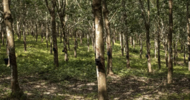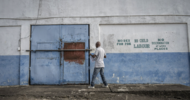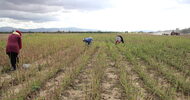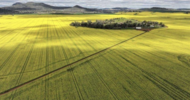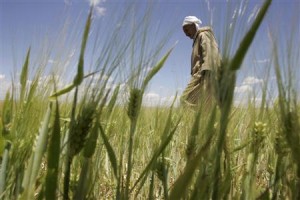
Xinhua | May 11 2010
Food security in Arab countries still faces big challenges despite the fact that food production continued to rise in recent years, officials said at a meeting of the General Assembly of the Arab Organization for Agricultural Development (AOAD).
Food imports in Arab countries kept increasing in the past years, resulting in soaring deficits in agricultural products trade, which has poised grim challenges for food security, officials said.
Statistics show that food exports in these countries have seen a jump of 19.8 percent from 9.6 billion US dollars in 2007 to 11.5 billion dollars in 2009. However, food imports have increased from 34.6 billion dollars in 2007 to 39 billion dollars in 2009.
AOAD head M. Tarek Ben Moussa Ezedjeli told the meeting that food shortage in the Arab world continued worsening. Between 2002 and 2004, 25 million people were affected by food shortages in Arab countries, more than one tenth of the total population in the area.
He also predicted that the food trade deficit in the Arab countries will increase at a pace of 5 percent annually in many years to come due to the expansion of local population and the rise in the grain prices on the global market.
Most of the Arab countries are located in Western Asia or Northern Africa, where the climate is not agreeable for crops to grow and arable land only accounts for a small proportion of the total area of the land.
An AOAD document shows that many Arab countries have insufficient food supply, and their domestic food market is thus more vulnerable to external influences. A surge of food prices on the international market can directly push up food prices on domestic markets and inflation in these countries. Inflation, in turn, can seriously affect people's livelihoods and cause social tension.
Moreover, some of these countries have undergone various periods of wars, and are listed by the UN Food and Agriculture Organization (FAO) as countries with bad shortage of food production and supply.
Algeria's official daily Al Shaab said that in Arab countries, agriculture investment is relatively low, the mode of production is backward, water supply and agriculture materials are facing intense shortages and low utilization rate, and desertification is threatening arable land. All these factors have crippled the agriculture development in Arab countries, which could hardly meet their national demand of food.
Although great problems of food security are lying before Arab countries, these countries have seen positive development in agricultural production, trade and consumption in recent years.
Statistics released by the AOAD show that from 2007 to 2009, the production of main crops has seen a jump of 4 percent to 12 percent. Output of grain, vegetables, fruit and fish have all increased by more than 8 percent.
In a letter addressed to the AOAD meeting, Algerian President Abdelaziz Bouteflika said Arab countries have realized their vulnerability in food security, and have long paid efforts in this area.
In 2005, the Algiers summit of the League of Arab States (LAS) asked the AOAD to draw a 2005-2006 strategy for sustainable agriculture development for Arab countries, which was passed at LAS' Riyadh summit in 2007, and asked the AOAD to analyze how to realize the integration of agriculture among Arab countries. In 2008, the AOAD announced the Riyadh Declaration, calling to start up the emergency program for food security in the Arab world, which was also passed at the 1st Arab economic forum in Kuwait in 2009.
Bouteflika said that the Arab nations should draw a comprehensive strategy for sustainable development for both industry and agriculture, making adjustment to the policies so that agriculture in the Arab nations can develop together. He said the Arab nations should face the impact the global financial crisis shed on agricultural production and trade, improve the competitiveness of their agricultural products on the international market, and build an Arab community of economy, technology, industry and agriculture.
Saudi Arabian Agriculture Minister Fahd Bin Abdul-rahman Bin Sulaiman Balghunaim said at the summit that Saudi Arabia was planning to invest in Algeria's agriculture, like Egypt and Sudan.
Media reports said the Arab nations should give full play to their advantages. For instance, members of the cooperation council for the Arab states of the Gulf, which are rich in funds, should invest more in countries like Sudan, which has a large area of arable land. In this way, Arab nations can implement their strategies of sustainable development of agriculture, realize the "agriculture integration of the Arab world," proposed at the LAS' Tunisia summit in 2004, and secure food security in the Arab world.
The AOAD, headquartered in Sudan's capital Khartoum, was established in 1970. The organization holds one session every two years.
At the 31st session, members have discussed issues relating to agriculture conditions and the organization's action plan for the period of 2011-2012.





